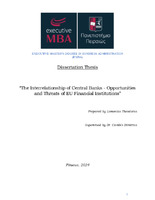The interrelationship of central banks - Opportunities and threats of EU financial institutions
Η συσχέτιση του ρόλου των κεντρικών τράπεζων - Κίνδυνοι και ευκαιρίες στο ευρωπαϊκό χρηματοπιστωτικό σύστημα

Master Thesis
Συγγραφέας
Lemonias, Theodoros
Ημερομηνία
2024-02-01Επιβλέπων
Cambis, DimitriosΚάμπης, Δημήτριος
Προβολή/
Λέξεις κλειδιά
Central banks ; Financial institutions ; Monetary policy ; Opportunities ; ThreatsΠερίληψη
This dissertation explores the interrelationships between by Central Banks (CBs) in executing their mandates for monetary policy and supervision of the banking system. The purpose of this thesis is to analyze CBs various functions and responsibilities in achieving their objectives, overseeing the financial system and the impact these decisions have on the financial institutes.
Chapter 1, delves into the historical development of CBs and examines their independence. It discusses the mandates and functions of CBs, as well as the tools they utilize to implement monetary policy and supervise the banking system. Furthermore, this chapter investigates the interrelationship between fiscal and monetary policies, and the impact of these policies in the post-pandemic period we are currently in.
Chapter 2, focuses on the supervisory role of Central Banks in the financial system. It describes the functions, structures, and ultimate objectives of financial institution control. Lessons are drawn from past experiences of tightening and loosening monetary policy and maps out systemic risks associated with these licensed/supervised institutions. Additionally, supervisory mechanisms for credit and operational risk control are briefly laid out, with particular emphasis on ECB.
Chapter 3, examines the opportunities and threats faced by CBs and supervised institutions with focus to ECB and EU Financial Institutions. This includes an analysis of mergers and acquisitions, the quality and type of securities per credit facility type, as well as the growing role of Fintech and ERP firms in times of modern banking.
In conclusion, this dissertation provides a comprehensive analysis of the mandates, functions, and supervisory roles of CBs in the context of monetary policy and financial system oversight. The exploration of opportunities and threats reveals the changing landscape of global finance and the evolving role of technology. The findings contribute to a deeper understanding of the challenges and potential strategies that CBs and supervised institutions may face in the future.

